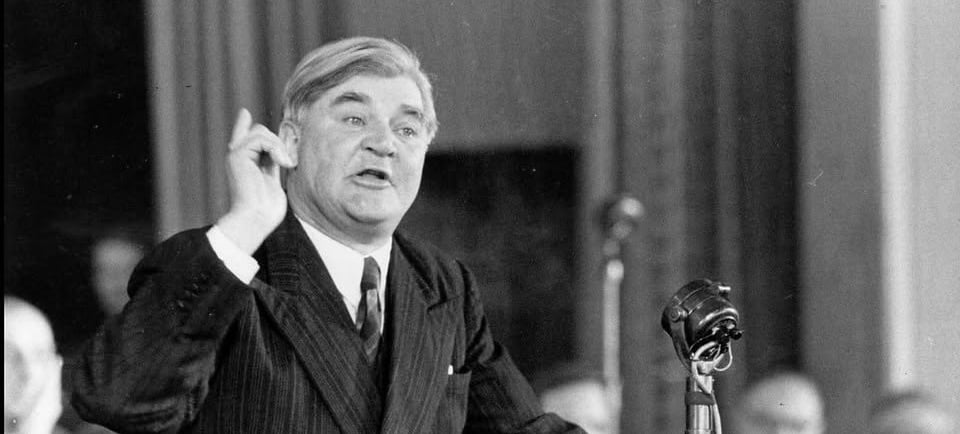What Would Aneurin Bevan Make of Today’s NHS – And What Change Do We Need in Wales?
Aneurin Bevan, the visionary founder of the NHS, would feel a mix of pride, dismay, and fierce resolve if he saw our health service today. While the core principle of universal care endures, he’d be dismayed by chronic understaffing, fragmented services, and crumbling infrastructure – especially in Wales. This isn't an inevitable decline, but a failure of political will. Bevan would demand honest funding, a robust workforce, and integrated care that puts people before politics. Discover what concrete steps a new political force could take in Wales to honour his legacy and rebuild our cherished NHS truly.
Jonathan Millard
11/17/20256 min read


What Would Aneurin Bevan Make of Today’s NHS – And What Change Do We Need in Wales?
As the founder of the NHS, Aneurin Bevan created something extraordinary: a health service based on need, not ability to pay. If he could see the modern NHS today, I think he’d feel three powerful emotions: pride, dismay, and resolve.
In this blog, I want to explore what Bevan might say if he were looking at our health service now – especially in Wales – and what any new political force serious about change could actually do to help.
Pride: The Principle Survives
Bevan’s core vision was simple and radical:
Healthcare should be free at the point of use, funded by general taxation, and available to all.
Despite decades of political change, economic shocks, and endless reforms, that principle largely remains intact. A child can be born safely, a pensioner can receive complex treatment, and families do not routinely face financial ruin because someone they love becomes ill.
In that sense, the NHS is still what Bevan called a “real piece of socialism” – a practical expression of mutual obligation. We share the risks of illness so that no one faces them alone.
For Bevan, the survival of that idea would be a source of real pride. The NHS is still a moral project, not just a service brand.
Dismay: A Service Starved of Its Own Ambition
But Bevan would not be sentimental about the NHS. He would look hard at how it actually works for people.
He would see:
Chronic understaffing
Not as an abstract workforce issue, but as:Long waits in A&E
Delayed diagnoses and cancelled operations
Exhausted staff making impossible choices at 4 a.m.
Fragmentation and complexity
Endless reorganisations, market mechanisms, and contracting arrangements have created a system that can feel disjointed – both for patients and the professionals trying to care for them.Crumbling buildings and outdated technology
An organisation asked to deliver 21st‑century medicine with 20th‑century infrastructure and 19th‑century estate problems.
In Wales, the picture is particularly stark: longer waiting lists, persistent pressure on emergency care, and real difficulty recruiting and retaining staff in some areas. Bevan would see all this as a failure of political will, not an inevitable consequence of modern life.
You cannot set the NHS a mission of comprehensive, modern healthcare and then withhold the resources, staff, and tools needed to deliver it.
Resolve: The Problems Are Political, Not Inevitable
Crucially, Bevan would not accept that “the NHS is broken” as a fixed truth. He would see today’s challenges as the result of decisions – and therefore open to better decisions.
He would insist that:
If we still believe healthcare is a right, not a privilege, we must fund it at the level of that belief.
If we expect world‑class services, we must give world‑class support to the people who provide them.
If we want integrated, humane care, we must organise for cooperation, not competition.
The NHS was built in the aftermath of the Second World War, in a poorer country than today, carrying massive debt and rebuilding from ruins. If we could create a universal health service, then we could certainly renew it now.
What Needs to Change – And What a New Political Force Could Do in Wales
Any party serious about improving the NHS in Wales – especially one positioning itself as an agent of change – has real choices. It’s not enough to criticise; there has to be a credible programme.
Here are concrete things that could be done in Wales to honour Bevan’s principles while tackling 21st‑century realities.
1. Make Workforce the First Priority
Every plan lives or dies on whether you have enough people to deliver it.
A serious Welsh reform agenda could:
Publish and fund a clear 10–15 year workforce plan
Increase training places for doctors, nurses, and allied health professionals.
Expand apprenticeships and “earn while you learn” routes into healthcare roles.
Improve retention, not just recruitment
Competitive, stable pay settlements were agreed early, not at the end of bitter disputes.
Safer staffing standards on wards and in primary care, backed by law and funding.
Better support for staff wellbeing – especially after COVID‑19 and continuous winter‑style pressures.
Target rural and deprived areas
Golden‑handshake schemes and housing support for staff willing to work in hard‑to‑recruit regions.
Flexible contracts that make it attractive to return to NHS Wales from agency work or jobs over the border.
Without this, nothing else works. Bevan would remind us: the NHS is its people.
2. Rebuild Primary Care and Community Services
Hospital crises are often symptoms of problems elsewhere.
A new political force could drive:
A primary care rescue plan
Protect and strengthen GP surgeries as the front door of the NHS, not an afterthought.
Fund more multi‑disciplinary teams around GP practices: pharmacists, mental health practitioners, physios, and advanced nurse practitioners.
Serious investment in prevention
Smoking cessation, obesity, and mental health support are embedded locally, not as distant programmes.
Public health campaigns linked to real, local services people can actually access.
24/7 urgent community response teams
So that not every crisis ends in an ambulance trip and an A&E wait.
If we want fewer ambulances queued outside hospitals, we need more help earlier, closer to home.
3. Integrate Health and Social Care in Practice, Not Just on Paper
In Wales, the line between health and social care too often traps people in hospital beds or leaves them without adequate support.
A practical reform agenda could:
Create joint health and social care budgets in key areas
So that the system is rewarded for keeping people well and independent, not for passing the bill from one budget to another.
Strengthen the social care workforce
Minimum fair pay as a starting point, with clear progression routes and training.
Parity of esteem with NHS staff, recognising that social care is essential, not optional.
Set clear discharge standards
No one should be stuck in a hospital purely because the paperwork or funding for support at home is in limbo.
Bevan’s philosophy was to see the person whole. Our structures should do the same.
4. Invest in Bricks, Mortar and Bytes
You cannot run a modern health service with crumbling buildings and outdated IT.
A reform‑minded approach in Wales could:
Set up a dedicated Welsh NHS capital renewal programme
Prioritise the worst estates and equipment, with a transparent, published timetable.
Deliver modern digital infrastructure
Shared electronic patient records across Wales, so information follows the patient, not the other way round.
Reduce duplication of tests and paperwork – freeing up clinician time and improving safety.
Use technology intelligently, not as a gimmick
Virtual consultations where they add value, not as a cheap substitute for proper access.
Data used to support clinical decision‑making, not just to generate league tables.
This is not about shiny gadgets; it’s about giving staff the basic tools they need to care safely and effectively.
5. Commit to Honest, Sustainable Funding
In Wales, funding is constrained both by the overall UK envelope and by choices made within the Welsh budget. Any party promising transformation must be honest about this.
A credible stance would mean:
Being upfront that you cannot cut your way to a better NHS
Efficiency matters, but it will not bridge every gap.
Exploring what can be done within devolved powers
Prioritising health and social care in Welsh budget decisions.
Being transparent with the public about trade‑offs elsewhere.
Using every pound more intelligently
Cutting wasteful duplication and overly complex management structures.
Ensuring money actually reaches the frontline rather than disappearing into bureaucracy.
Bevan would say: if you believe in the principle, you must be willing to pay for it – and you must tell the public the truth.
6. Simplify the System for Patients and Staff
Complexity is exhausting. Patients don’t care which bit of the system “owns” their problem; they just need help.
A Welsh reform agenda could:
Streamline structures and reduce churn
Fewer major reorganisations, more focus on making existing organisations work better together.
Create clear, single points of access for urgent care
So people know where to go and don’t end up bouncing around between services.
Empower local leadership
Give local clinicians and managers more say over how services are organised in their communities, with proper accountability.
The goal is simple journeys for patients, not neat organisational charts for politicians.
7. Rebuild the Moral Contract
Finally, any serious project to renew the NHS in Wales has to attend to the moral contract at its heart:
Between the staff and the service
“Give us the tools, time, and respect – and we will move mountains.”
Between the public and politicians
“Be honest with us about what’s possible, what it costs, and what will change.”
That means:
Standing up for NHS and social care staff in public, not using them as a shield or a scapegoat.
Engaging the public in the hard choices ahead, not pretending that everything can improve instantly at no cost.
Celebrating success as loudly as we criticise failure.
Bevan understood that cynicism is contagious – but so is hope.
The Choice in Front of Wales
If Aneurin Bevan walked through a Welsh hospital today, he would recognise two things instantly:
The spirit of the service – the commitment of staff and the principle of care based on need – is still alive.
The strain on the system is unsustainable and unnecessary.
For any new political force in Wales claiming to offer a different path, the test is simple:
Will you staff the service properly?
Will you fund it honestly?
Will you integrate health and social care so people experience a system, not several silos?
Will you simplify and support, rather than endlessly reshuffle and rebadge?
And will you tell the truth about the choices involved?
The NHS was not a gift from history; it was a political choice. Its renewal, in Wales and across the UK, will not happen by accident either. It, too, will be a political choice.
The real question for us now is whether we still believe, as Bevan did, that healthcare is a right – and whether we are prepared to act, organise, and pay as if that belief truly matters.


